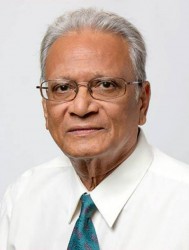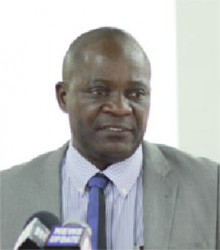Education Minister Dr Rupert Roopnaraine yesterday said he will be selecting individuals who have professional experience in education to make up the new University of Guyana (UG) Council.
Roopnaraine also said he intends to engage with UG Vice-Chancellor (VC) Professor Jacob Opadeyi on his effectiveness as head of the institution, in light of the lack of confidence in him that has been voiced by the UG workers’ unions and the students’ society.
On Thursday, the unions called on the new minister to pull politically partisan appointees from the university’s Council and to ensure the non-renewal of Opadeyi’s contract.
Roopnaraine yesterday told Stabroek News that the make-up of the council “is an issue about which the unions need not worry.”
“I am presently going about the setting up of a new council. Through consultations with the various relevant organisations and entities, I am in the process of selecting individuals who have professional experience in education and who can be counted on to act in the best interest of the university,” he said.

On the matter of Opadeyi, the minister noted that the VC apparently has great difficulties working with the unions and students. He did not definitively state what action will be taken but disclosed that, “I will be have a frank discussion with him about how effective he feels he can be in this situation.”
Repeated efforts to contact Opadeyi for comment were unsuccessful.
In a joint statement on Thursday, the University of Guyana Senior Staff Association (UGSSA) and the University of Guyana Workers’ Union (UGWU) also said they expected Roopnaraine to match his verbal commitment to the university with an “adequate” financial one to improve the quality of tuition.
The unions noted Roopnaraine’s assessment that the university has been “starved of finance critically needed to maintain its physical plant and ensure the availability of needed material supplies for effective instruction.”
“Faculty, staff and students look forward to the day when classes will be held in well-equipped lecture rooms rather than the ‘stables,’ when snakes, horses, cows, stray dogs and other animals are not regular visitors to our walkways and environs and, when visits to faculty and university offices to get basic tasks completed are not met with apologetic shrugs because ‘there is no ink, paper, white board markers, ’ or the printer, photocopier isn’t working,” they said.
‘Excessive influence’

In addition to the need for an adequate infusion of funds to improve the quality of teaching/learning at UG, the unions called for the politically partisan appointees on the university’s Council to be replaced with adequately qualified professionals solely focused on UG’s development, as well as the removal of Opadeyi, in light of their lack of confidence in his ability to be UG’s executive head.
At the level of the council, the unions note that the “University has always suffered from a dictatorial, authoritarian structure that gives the ruling party excessive influence through the University Council.”
Presently, the UG Acts and Statutes give sole discretion to the sitting Minister of Education to determine eight members of the Council, which constitutes a quorum. The statement charges that “with (a) the absence of four nominees from overseas University Associations, who are never appointed due to either insufficient funds to pay for their attendance at meetings or to the fact the organisations no longer exist; and (b) a mere four academic members of the 26 member Council, the academic purposes of the University aren’t being realised.” Instead, they say “the Council is dominated by partisan political appointees who act in the best interest of their political parties,” a situation that has existed for “50 years and which must change!”
In April, 2012, the two staff unions along with the students’ union, the UGSS, petitioned Parliament requesting a review and urgent change in the UG Acts and Statutes to ensure the depoliticisation of the Council. Roopnaraine, then an opposition parliamentarian, had introduced in Parliament the petition on behalf of the unions and chaired the parliamentary select committee that was established to examine the UG Acts and Statutes.
The unions called on the minister to speedily ensure that the UG’s Acts and Statutes are changed to ensure that those appointed to serve on the Council have the adequate qualifications/experience to contribute in a meaningful manner.
Even as the process to change the statutes is in train, the unions have asked that Roopnaraine quickly withdraw those “distinctly politically partisan appointees” on the Council and, following consultation with the varying interest groups they ought to have represented, replace them with individuals whose sole agenda is the development of UG.
‘No confidence’
Meanwhile, at the administrative level, the unions reiterated that they have no confidence in Opadeyi, who according to the UG Acts and Statutes, is the ‘executive head’ with responsibility for the general administration of the institution.
They accused Opadeyi of failing to deliver good governance, financial management and control in the areas of his authority and responsibility. They further said that there can be no transformation of the university under his leadership and therefore asked that his contract, which ends in February, 2016, not be renewed.
According to the unions, Opadeyi’s failings include his failure to prioritise the teaching and learning environment, which saw virtually no improvement in that environment despite increases in student fees, and student action to demand such improvement.
This accusation was supported by claims made by the University of Guyana Student Society (UGSS) President Joshua Griffith, who informed the Student Body on Wednesday that “the committee indicated to have the responsibility of managing the learning resource fee ($40,000 per student) – he majority of the recently imposed hefty facility fee, has not been properly convened to date, some nine (9) months after the beginning of this academic year 2014/2015.”
Griffith further noted that “after numerous letters to the administration over the past months which have only resulted in unfulfilled promises to properly convene said commit-tee.numerous letters to the administration over the past months has resulted only in failed promises to convene such a committee.” He referred to these actions by the administration as “a deceitful and discourteous act in a blatant disregard of an established agreement and principle and an affront the trust and sacrifices made by students to pay increased fees.”
The VC was further accused by the unions of having a dictatorial, vindictive micro-management style that has led to him presiding over demoralised and demotivated staff; of being unwilling to genuinely consult with the established decision-making bodies of the university; of alienating staff at all levels as he seeks to arbitrarily close departments, including the most productive research department at UG, the Institute of Development Studies (IDS); and bully staff on the workload policy, among other things.
Earlier this year, UG workers had for five weeks engaged in strike action, which disrupted classes, to press their demands for better wages and working conditions. On March 1st, 2015, a Terms of Resumption Agreement was signed and saw staff returning to the classrooms on March 3rd, 2015 while negotiations continued to permanently resolve the concerns raised. These negotiations are still ongoing.




